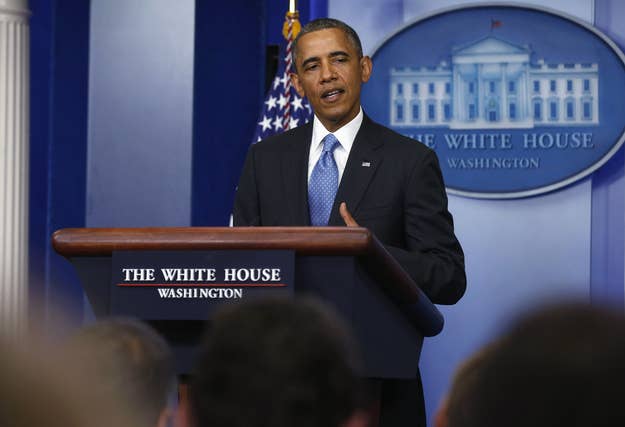
WASHINGTON — President Obama surprised the country Friday with some of his most frank comments about race in America since his famous race speech on the campaign trail in 2007.
In 20 minutes of remarks before the regularly scheduled White House press briefing unannounced by the White House staff beforehand, the president laid out a very personal case for why African-Americans are so outraged by the verdict in the George Zimmerman case — and said that despite the tensions following the verdict, America is on a long, winding path away from racism.
But the country isn't there yet, Obama said.
"When you think about why, in the African-American community at least, there's a lot of pain around what happened here, I think it's important to recognize that the African-American community is looking at this issue through a set of experiences and a history that doesn't go away," he said. Growing up black and male in America is growing up under suspicion, Obama said, and that's why the Martin case resonated so strongly.
"There are very few African-American men in this country who haven't had the experience of being followed when they were shopping in a department store. That includes me," he said. "There are probably very few African-American men who haven't had the experience of walking across the street and hearing the locks click on the doors of cars. That happens to me — at least before I was a senator."
"There are very few African-Americans who haven't had the experience of getting on an elevator and a woman clutching her purse nervously and holding her breath until she had a chance to get off," he added. "That happens often...I don't want to exaggerate this, but those sets of experiences inform how the African-American community interprets what happened one night in Florida."
Obama declined to weigh in on the verdict itself, saying only that the trial was "professional" and the jury "had spoken." Instead, in personal terms, Obama called on the case to be the starting point for a new conversation in America about black men and the struggles they face in modern society. Rather than be the nation's lawyer-in-chief when it came to the intricacies of the trial, Obama decided to be its racial educator-in-chief. It's a role he's played before, but seldom with the passion he brought to the conversation Friday.
"The African-American community is also knowledgeable that there is a history of racial disparities in the application of our criminal laws, everything from the death penalty to enforcement of our drug laws. And that ends up having an impact in terms of how people interpret the case," Obama said. "This isn't to say that the African-American community is naive about the fact that African-American young men are disproportionately involved in the criminal justice system, that they're disproportionately both victims and perpetrators of violence. It's not to make excuses for that fact."
Obama embraced Attorney General Eric Holder's call to reevaluate "Stand Your Ground" and similar self-defense legal constructs after the Zimmerman verdict, and called on the federal government to lead an effort to help state and local law enforcement agencies confront the skepticism they face from African-Americans. He suggested one way to do that would be through data collection, breaking down arrests and other interactions with the law along racial lines as he did with legislation in Illinois when he was state legislator.
"For those who resist that idea, that we should think about something like these 'Stand Your Ground' laws, I just ask people to consider, if Trayvon Martin was of age and armed, could he have stood his ground on that sidewalk? And do we actually think that he would have been justified in shooting Mr. Zimmerman, who had followed him in a car, because he felt threatened?" Obama said. "And if the answer to that question is at least ambiguous, then it seems to me that we might want to examine those kinds of laws."
Beyond those comments, though, Obama said he sees America shifting away from the racial ugliness in its past, though he said the process is ongoing. He said it's time for Americans to ask themselves if they're helping that process move along.
"In families and churches and workplaces, there's a possibility that people are a little bit more honest and at least you ask yourself your own questions about, 'Am I wringing as much bias out of myself as I can? Am I judging people as much as I can based on not the color of their skin, but the content of their character?'" Obama said. "That would, I think, be an appropriate exercise in the wake of this tragedy."
Progress has been made, Obama said. But unless white and black America can have a real dialogue after events like the Martin killing, that progress will be slowed.
"Each successive generation seems to be making progress in changing attitudes when it comes to race. It doesn't mean we're in a post-racial society. It doesn't mean that racism is eliminated," Obama said. "But, you know, when I talk to Malia and Sasha and I listen to their friends and I see them interact, they're better than we are. They're better than we were on these issues."
"We have to be vigilant," he added. "And we have to work on these issues. And those of us in authority should be doing everything we can to encourage the better angels of our — nature as opposed to using these episodes to heighten divisions."

